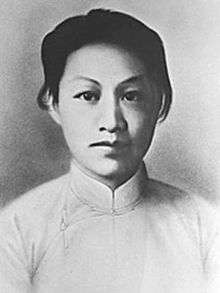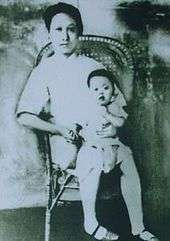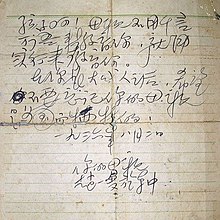Zhao Yiman
Zhao Yiman (Chinese: 趙一曼; Wade–Giles: Chao I-man; 1905 – 2 August 1936) was a female Chinese resistance fighter against the Imperial Japanese Army in Northeast China, which was under the occupation of the Japanese puppet state Manchukuo. She was captured in 1935 by Japanese forces and executed in 1936.[1] She is considered a national hero in China, and an eponymous biopic was made for her in 1950. The 2005 film My Mother Zhao Yiman was based on her son's memory of her.[2]
| Zhao Yiman | |||||||||
|---|---|---|---|---|---|---|---|---|---|
 | |||||||||
| Traditional Chinese | 趙一曼 | ||||||||
| Simplified Chinese | 赵一曼 | ||||||||
| |||||||||
Biography

Zhao was born Li Kuntai (李坤泰) to a rich family of Sichuan Province in October 1905.
She joined the Communist Party of China in 1926. In September 1927, she went to the Soviet Union to study at the Moscow Sun Yat-sen University. She married her comrade Chen Dabang (陈达邦). She returned to China in the winter of 1928, and engaged in the underground Communist work in Shanghai, and then in Jiangxi Province.
After the Mukden Incident, she was sent to northeast China to start up struggles against the Japanese occupation. She changed her name as Zhao Yiman to avoid implicating her family.
In November 1935, the Imperial Japanese Army and the Manchukuo troops encircled the 2nd Regiment of the 3rd Army of the Northeast Anti-Japanese United Army. Zhao Yiman, who was political commissar of the regiment, was seriously wounded. Several days later, the Japanese found Zhao in a farmhouse where she stayed. In the ensuing fighting, she was wounded again and captured. Zhao was tortured after an argument with the questioners. In view of her political value, the Japanese sent her to a hospital to receive treatment. In the hospital, Zhao persuaded Han Yongyi, a female nurse, and Dong Xianxun, a guard, to help her escape. However, she was recaptured not far from the guerrilla base and suffered further torture due to her attempted escape.[3]

She was executed by the Japanese on 2 August 1936. Before her execution, she wrote a farewell letter to her son Ning'er (formal name Chen Yexian), which has survived.
The guard, who helped Zhao to escape, Dong, soon also died in the prison after being tortured.
Memorial
.jpg)
Zhao Yiman is featured as one of the revolutionary heroes in the Northeast China Revolutionary Martyrs Memorial Hall located at 241 Yiman Street in the Nangang district of Harbin.
References
- "Peace wall symbolizes brighter tomorrow". China Daily. Retrieved 4 April 2009.
- "China to play dozens of films to mark CPC's 85th birthday". People's Daily. 15 June 2006. Retrieved 4 April 2009.
- "Zhao Yiman: A National Heroine in Anti-Japanese War". 28 September 2006. Retrieved 31 May 2009.